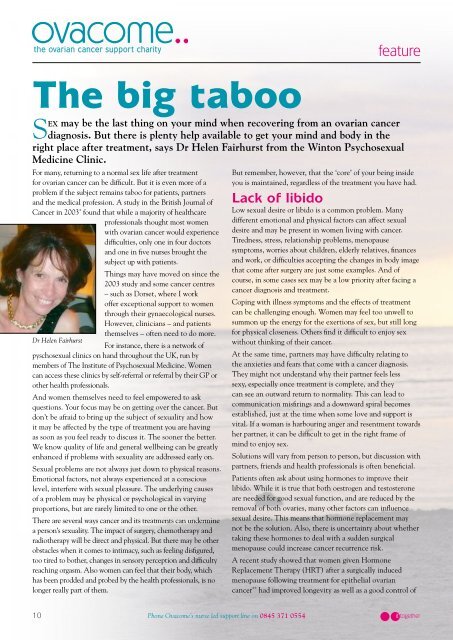Ovacome Summer 2014
Ovacome Summer 2014
Ovacome Summer 2014
Create successful ePaper yourself
Turn your PDF publications into a flip-book with our unique Google optimized e-Paper software.
feature<br />
The big taboo<br />
Sex may be the last thing on your mind when recovering from an ovarian cancer<br />
diagnosis. But there is plenty help available to get your mind and body in the<br />
right place after treatment, says Dr Helen Fairhurst from the Winton Psychosexual<br />
Medicine Clinic.<br />
For many, returning to a normal sex life after treatment<br />
for ovarian cancer can be difficult. But it is even more of a<br />
problem if the subject remains taboo for patients, partners<br />
and the medical profession. A study in the British Journal of<br />
Cancer in 2003 * found that while a majority of healthcare<br />
professionals thought most women<br />
with ovarian cancer would experience<br />
difficulties, only one in four doctors<br />
and one in five nurses brought the<br />
subject up with patients.<br />
Things may have moved on since the<br />
2003 study and some cancer centres<br />
– such as Dorset, where I work<br />
offer exceptional support to women<br />
through their gynaecological nurses.<br />
However, clinicians – and patients<br />
themselves – often need to do more.<br />
Dr Helen Fairhurst<br />
For instance, there is a network of<br />
pyschosexual clinics on hand throughout the UK, run by<br />
members of The Institute of Psychosexual Medicine. Women<br />
can access these clinics by self-referral or referral by their GP or<br />
other health professionals.<br />
And women themselves need to feel empowered to ask<br />
questions. Your focus may be on getting over the cancer. But<br />
don’t be afraid to bring up the subject of sexuality and how<br />
it may be affected by the type of treatment you are having<br />
as soon as you feel ready to discuss it. The sooner the better.<br />
We know quality of life and general wellbeing can be greatly<br />
enhanced if problems with sexuality are addressed early on.<br />
Sexual problems are not always just down to physical reasons.<br />
Emotional factors, not always experienced at a conscious<br />
level, interfere with sexual pleasure. The underlying causes<br />
of a problem may be physical or psychological in varying<br />
proportions, but are rarely limited to one or the other.<br />
There are several ways cancer and its treatments can undermine<br />
a person’s sexuality. The impact of surgery, chemotherapy and<br />
radiotherapy will be direct and physical. But there may be other<br />
obstacles when it comes to intimacy, such as feeling disfigured,<br />
too tired to bother, changes in sensory perception and difficulty<br />
reaching orgasm. Also women can feel that their body, which<br />
has been prodded and probed by the health professionals, is no<br />
longer really part of them.<br />
But remember, however, that the ‘core’ of your being inside<br />
you is maintained, regardless of the treatment you have had.<br />
Lack of libido<br />
Low sexual desire or libido is a common problem. Many<br />
different emotional and physical factors can affect sexual<br />
desire and may be present in women living with cancer.<br />
Tiredness, stress, relationship problems, menopause<br />
symptoms, worries about children, elderly relatives, finances<br />
and work, or difficulties accepting the changes in body image<br />
that come after surgery are just some examples. And of<br />
course, in some cases sex may be a low priority after facing a<br />
cancer diagnosis and treatment.<br />
Coping with illness symptoms and the effects of treatment<br />
can be challenging enough. Women may feel too unwell to<br />
summon up the energy for the exertions of sex, but still long<br />
for physical closeness. Others find it difficult to enjoy sex<br />
without thinking of their cancer.<br />
At the same time, partners may have difficulty relating to<br />
the anxieties and fears that come with a cancer diagnosis.<br />
They might not understand why their partner feels less<br />
sexy, especially once treatment is complete, and they<br />
can see an outward return to normality. This can lead to<br />
communication misfirings and a downward spiral becomes<br />
established, just at the time when some love and support is<br />
vital. If a woman is harbouring anger and resentment towards<br />
her partner, it can be difficult to get in the right frame of<br />
mind to enjoy sex.<br />
Solutions will vary from person to person, but discussion with<br />
partners, friends and health professionals is often beneficial.<br />
Patients often ask about using hormones to improve their<br />
libido. While it is true that both oestrogen and testosterone<br />
are needed for good sexual function, and are reduced by the<br />
removal of both ovaries, many other factors can influence<br />
sexual desire. This means that hormone replacement may<br />
not be the solution. Also, there is uncertainty about whether<br />
taking these hormones to deal with a sudden surgical<br />
menopause could increase cancer recurrence risk.<br />
A recent study showed that women given Hormone<br />
Replacement Therapy (HRT) after a surgically induced<br />
menopause following treatment for epithelial ovarian<br />
cancer ** had improved longevity as well as a good control of<br />
10 Phone <strong>Ovacome</strong>’s nurse led support line on 0845 371 0554<br />
it together



